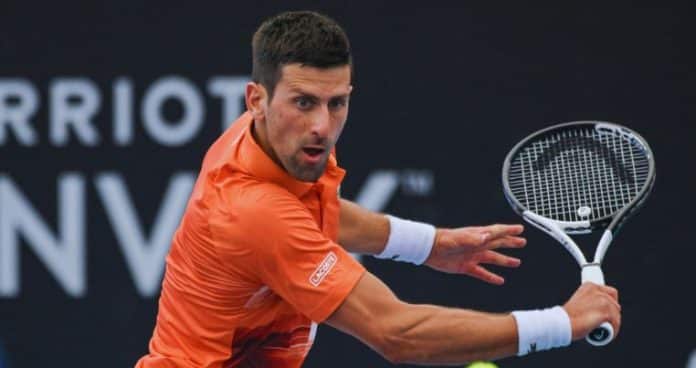Novak Djokovic has drawn criticism for a sending a political message regarding the ongoing violence in Kosovo. The Sebian Tennis player wrote “Kosovo is the heart of Serbia. Stop the violence” (translation) on a camera lens after winning against American Aleksandar Kovacevic at the French Open in Paris.
https://twitter.com/Spriter99880/status/1663196484899094531
Novak Djokovic Considers Kosovo a Part of Serbia
Novak Djokovic referred to the ongoing tensions between Kosovo and Serbia with his message. Kosovo and Serbia are two Balkan countries that have a long history of conflict and dispute over Kosovo’s status. Kosovo, which has a majority of ethnic Albanians, declared its independence from Serbia in 2008, after a war in the late 1990s that ended with a NATO intervention. Serbia, which considers Kosovo part of its territory and has a minority of ethnic Serbs living there, refuses to recognize Kosovo’s independence. The two countries have been involved in negotiations to normalize their relations, but tensions remain over issues such as license plates, border crossings, and minority rights.
The latest conflict happened on 29 May 2023, when Kosovo police raided Serb-dominated areas in northern Kosovo and seized local municipality buildings. The police action was meant to enforce the authority of ethnic Albanian mayors who were elected in a vote that Serbs boycotted. Serb protesters clashed with Kosovo police and NATO peacekeeping troops who were guarding the town halls. Reportedly, more than 25 NATO soldiers and two Serbs were injured in the violence.
Serbia’s president, Aleksandar Vučić, reacted by putting the Serbian army on the highest level of combat alert and accusing Kosovo of trying to destabilize the region. Kosovo’s president, Vjosa Osmani, blamed Vučić for inciting the Serb protesters and violating the agreements between the two countries. NATO’s secretary general, Jens Stoltenberg, condemned the violence and announced the deployment of 700 additional troops to keep the peace.
However, the situation remains volatile, as both sides accuse each other of violating their sovereignty and human rights. The international community has urged dialogue and restraint to avoid further escalation and violence.
Calls for Disciplinary Action
Djokovic’s message angered many, especially in Kosovo, which considered itself independent from Serbia. Many people and organizations have been accusing him of using sport as a platform to promote “Serbian nationalists’ propaganda” and to raise “the level of tension and violence between the two countries”.
The Kosovan Olympic Committee called for the International Olympic Committee (IOC) and the International Tennis Federation (ITF) to take disciplinary action against Djokovic for breaching the fundamental principle of political neutrality in sport.
The French Sports minister Amélie Oudéa-Castéra also criticized Djokovic’s remarks and warned him against making political statements at the French Open. She emphasized the need to differentiate between messages defending human rights and those that are highly activist and political. She further asserted that Djokovic’s involvement in this particular matter was not advisable, especially considering the current circumstances, and should not be repeated. She made a distinction by highlighting her support for messages in solidarity with Ukraine against Russia’s invasion, indicating that she did not place Kosovo and Ukraine on the same level. She mentioned the case of Ukrainian player Marta Kostyuk, who was booed by the audience for not shaking hands with Belarusian player Aryna Sabalenka. Kostyuk’s action was because of Belarus’ alliance with Russia and its involvement in the invasion of Ukraine. The sports minister recognized the difficulties faced by Ukrainians and respected Kostyuk’s choice.
Political Neutrality in Sports
The governing body for Tennis, The International Tennis Federation (ITF), stated that Djokovic’s message did not violate any rules as the Grand Slam rulebook does not prohibit political statements.
The French Tennis Federation, responsible for organizing the French Open, clarified that there are no specific rules regarding players’ statements at Grand Slam tournaments. They stated that it is understandable for discussions about international news events to occur during the tournament. The federation affirmed that the same rules apply to all four Grand Slams, and the tournament referee and Grand Slam Supervisors ensure compliance with these rules. Messages concerning such matters are relayed to the respective players’ teams.
Ukrainian tennis player Elina Svitolina, who has been vocal about tennis’ response to the Russian invasion, supported Djokovic’s right to express his views. Svitolina emphasized the importance of freedom of expression in the world and encouraged athletes to share their opinions.
Why did Djokovic Say That?
Djokovic, a 22-time Grand Slam singles champion, defended his message, stating that he is against wars, violence, and conflicts but considers the situation in Kosovo as a precedent in international law.
He said he wrote the message to show his support for Serbs and for “all of Serbia,” as some of them are being “expelled” from their home districts. He said he was not a politician and did not intend to enter into debates.
He expressed his support for the Serbian people and emphasized the significance of Kosovo as a cultural and historical part of Serbia. Djokovic’s message, although controversial, serves as a reminder of the deep-rooted complexities involved in the Kosovo-Serbia relationship.


